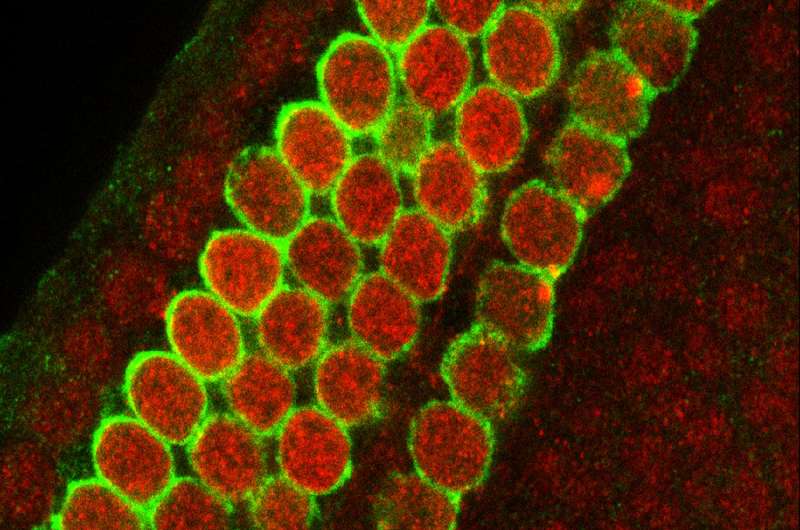Cisplatin may cause more permanent hearing loss in people with Cockayne syndrome

The chemotherapy drug cisplatin can kill cancer, but it can also cause permanent hearing loss.
The drug can kill the sensory cells of the inner ear, a phenomenon that is likely more severe in individuals with Cockayne syndrome, a rare form of dwarfism. The disorder results from mutations in one of two genes—called Csa and Csb—involved in repairing DNA damage. Cells can sustain DNA damage from environmental stresses ranging from the sun's ultraviolet radiation to toxic chemicals such as chemotherapy drugs.
"Chemotherapy using the drug cisplatin saves lives by killing rapidly dividing cancer cells, so it is a mystery why a major side effect of treatment is hearing loss caused by the death of the non-dividing sensory hair cells of the inner ear," said Neil Segil, senior author and a professor of research in the Department of Stem Cell Biology and Regenerative Medicine at the Keck School of Medicine of USC. "Our studies of a mouse model of Cockayne syndrome are the first to point to the importance of ongoing DNA repair in protecting the sensitive sensory hair cells of the inner ear from such environmental stress. We show that the same mutations, causing Cockayne syndrome in humans, make the sensory hair cells of mice hypersensitive to DNA damage caused by cisplatin chemotherapy."
The study was published on the cover of the Journal of Neuroscience in late April.
In humans, Cockayne syndrome can cause hearing loss as well as eye abnormalities, shortness, skeletal deformities, microcephaly, nervous system underdevelopment, an appearance of premature aging and sun sensitivity.
Like similar chemotherapy drugs, cisplatin damages the DNA in cells, interfering with their ability to proliferate. This interference is expected to have the most pronounced effect on the most proliferative cells, such as cancer cells, and the least effect on non-dividing cells, such as the sensory cells of the inner ear.
However, in practice, cisplatin causes significant death of both quickly dividing cancer cells and the non-dividing sensory cells of the inner ear—making it an effective chemotherapy drug with a common side effect: severe hearing loss. Young children undergoing cisplatin chemotherapy appear to be particularly vulnerable; they experience developmental delays as a result of early hearing loss.
Like humans with Cockayne syndrome, mice with mutations in Csa and Csb can't efficiently repair DNA damage, leaving them particularly vulnerable to permanent hearing loss from cisplatin. In the study, mice with the Csa mutation fared somewhat worse than mice with the Csb mutation.
Both mutations interfere with what is known as transcription-coupled DNA repair, or TCR. While there are many different ways that cells can repair DNA damage, TCR appears to play a particularly important role in protecting the sensory cells of the inner ear from cisplatin. Variation between individuals in the effectiveness of TCR may help explain the differing susceptibility to hearing loss due to environmental stress and aging.
"Our cells have several biochemical pathways that they use to repair DNA," Segil said. "Our findings suggest that one particular pathway, transcription-coupled DNA repair, is a major force for protecting the cells of the inner ear from cisplatin. The impairment of this repair pathway in patients with Cockayne syndrome leaves them particularly vulnerable to severe hearing loss as a side effect of taking this chemotherapy drug."















